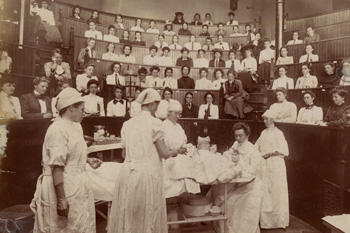“Mary is sharp as a tack!,” my grandmother marveled, “And she’s excited to meet you.”
We walked down the quiet carpeted hall of my grandmother’s retirement community toward Mary’s apartment. She opened the door, eyes bright and snow-white hair coiffed into a chignon.
“Welcome! Always good to meet another doctor,” she exclaimed, “Though it’s been awhile since I practiced.”
Mary was 103 years old. She graduated from medical school in 1931, seventy years before me. Her career began just after the discovery of penicillin.
We sat down for herbal tea and gingersnaps, my brain brimming with questions for this path-breaking physician.
“I was going to be a chemist, but my husband was in medical school, and he thought I would be better working with people instead of in a lab. He petitioned the dean to let me in,” she said with a wink.
“Wow – that must have been challenging, to be a woman so early in our profession,” I said.
“There were a few other women in our class, but I never felt we were treated differently in school,” she mused.
“But out in practice was another story – many people didn’t trust a woman for their care. I ended up opening a practice in a poor neighborhood of Washington, DC, delivering babies and treating the women and children there.”
“It was very rewarding work,” she continued, “In the end, just what I wanted to be doing. Though there wasn’t a lot we could do – often no cures, just words of comfort,” she continued, “You young doctors have so much at your disposal nowadays.”
I marveled at her humility. She found her life routine. I saw her as a living monument.
Now women make up more than half of medical students and more than a third of practicing US physicians; it’s easy to forget that as recently as 70 years ago, women physicians were rare.
Today is National Women Physicians Day, celebrated on the birthday of Dr. Elizabeth Blackwell, considered the United States’ first female physician. Her struggle to enter our profession is well known.
But she is not the only pioneer. Many other early female physicians, though deserving of books and holidays, receive little attention.
Merit Ptah, the physician who cared for pharaohs in ancient Egypt, immortalized as a faded image on a nearly 5,000 year-old stone tomb.
Metrodora, who wrote the first known medical text written by a woman, On the Diseases and Cures of Women, based her gynecologic and surgical practice in ancient Greece.
Dr. Dorotea Bucca, the Italian physician who at the turn of the 14th century served as chair of medicine at the University of Bologna for decades.
Dr. Elizabeth Magnus Cohen, called to medicine after the death of her son from measles, who opened a practice in New Orleans in 1857 and fought epidemics of smallpox, typhoid and yellow fever.
Dr. Rebecca Lee Crumpler, who completed her medical degree during the Civil War, becoming the first African-American female physician. After treating freed slaves in the early Reconstruction South, she spent her career caring for women and children in Boston, regardless of their ability to pay.
Dr. Aletta Jacobs, who after convincing the Dutch government to open universities to women, became a trailblazing advocate for women’s health – running a free clinic for poor women and sex workers, improving contraceptive methods and leading the international movement for a woman’s right to vote.
Dr. Anandi Gopal Joshi, inspired to become a physician after the death of her infant son, who left her native Calcutta to attend medical school in America, struggled with tuberculosis to complete her studies, and returned to India where she served a short time as head physician of her hospital’s female ward before her illness claimed her young life.
Dr. Lillie Rosa Minoka-Hill, among the first Native American women to earn an MD, who raised six children while practicing among the Oneida and fighting the 1918 flu epidemic in her rural Wisconsin community.
Dr. Eloisa Diaz, the first female physician in South America, who at the turn of the 19th century worked for the public health of Chile’s children through school breakfast programs, vaccination campaigns and efforts against rickets and tuberculosis.
Dr. Vera Gedroitz, the first female surgeon in Russia, who braved bullets and freezing weather to operate in clay-covered tents and converted railcars on the front of the Russo-Japanese war, demonstrating the need for prompt surgery for abdominal gunshot wounds.
Dr. Marie Equi, commended for her treatment of victims of the devastating 1906 San Francisco earthquake and fire, who ran an Oregon clinic for women and children, provided birth control and abortion even though they were not yet legal, and joined local cannery workers on the picket line to fight for safe conditions.
Dr. Elsie Inglis, the Scottish physician and suffragette who organized female-staffed relief hospitals for the Allies in World War I, herself running a large war hospital in Serbia and fighting a typhus epidemic there.
Dr. May Edward Chinn, the daughter of a former slave father and a Native American mother, who after being refused a position at all the New York hospitals because she was African-American, opened her own practice in jazz-era Harlem. Seeing tragically advanced cancers in her patients spurred her to research – she helped develop the Pap smear and cancer screening programs.
Let us celebrate this diverse and brave sisterhood of women physicians. They lived lives of extraordinary service, exemplifying the humanitarian heart of medicine, treating those their communities generally marginalized and neglected – children, women, sex workers, laborers, slaves, veterans, the poor.
Like Mary, they defied the expectations of their generation.
In the spring following our visit with her, my grandmother called to tell me Mary had died just after her 104th birthday.
Mary did not see herself as a pioneer. But as a young physician, I was grateful for the trail she forged, and happy I got the chance to thank her over tea.
*Learn more at Changing the Face of Medicine.
*Support women in medicine here.


Beautiful- Thank you for describing your visit with Mary. 1931! I can only imagine all the differences in our experiences of medical school and being a physician in comparison to hers. She was an early leader and helped to pave the way for us even if we continue to struggle with equality. Happy National Women Physicians Day!
Thank you! She was an amazing person, and didn’t take organic chemistry in medical school because it basically didn’t exist yet!
Thank you for this! I was trying to collect early female stories & read about them but didn’t have time. Your summary here is perfect, and I enjoyed how you weaved in an interview with an early woman physician.
Thanks Joannie for your kind words! Your blog is great.
Is this photo at the women’s medical college in philly?
Yes.